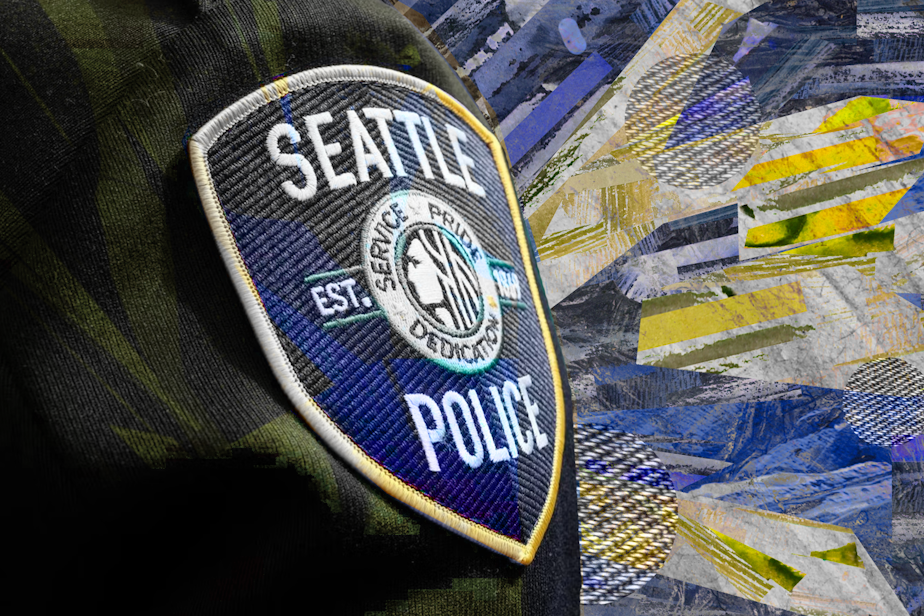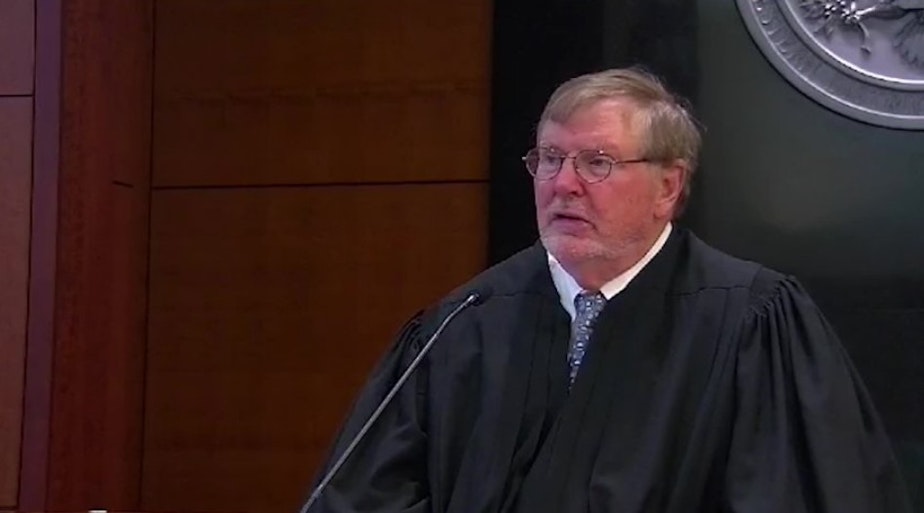Seattle police face reckoning over 'culture' in 2024 as federal oversight winds down

C
ommunity members were grief-stricken when a Seattle police officer struck and killed a young woman while speeding to a call on Jan. 23, 2023. They were outraged when, months later, body camera video surfaced in which a top member of the Seattle Police Officers Guild was heard joking about the incident.
The footage, released in September, featured Det. Daniel Auderer, the union's vice president, laughing while discussing details surrounding the death of Jaahnavi Kandula, a 23-year-old graduate student. Auderer, who was involved in the initial investigation into Kandula's death, said she had "limited value" while on a phone call with the union's president, Mike Solan.
Auderer said the video took his comments out of context. But the scandal made global headlines and harmed community trust in Seattle police at a critical time.
Sponsored
The Guild, which represents rank-and-file cops, has been locked in protracted, confidential negotiations with the city over a new labor contract. That contract will play a key role in how Seattle handles questions of police accountability.
RELATED: Out of line or out of context? Seattle police union responds to controversial bodycam video
A federal judge overseeing the city's work to establish stronger accountability standards will be paying close attention to whether the next contract addresses concerns about the Seattle Police Department's internal culture — namely, its disciplinary system and its willingness to comply with local accountability mandates.
Though city leaders are eager to regain local control of policing after more than a decade of federal involvement, oversight partners and police officials recognize how much is riding on the union contract, especially in the wake of the firestorm surrounding Kandula's death and other scandals from the past year.
“I think that how we handle those incidences really speaks to what our culture is, and whether or not we identify the misdeeds of individuals as being serious," said Lisa Herbold, an outgoing member of the Seattle City Council.
Herbold, who worked to beef up police oversight as chair of the Council's Public Safety Committee, noted that a healthy police culture doesn’t mean controversies never happen, but that there is a robust system to address them.
Sponsored
Shattered community trust
For some community justice advocates, Kandula's death and subsequent footage of union leaders' reactions have renewed existing doubts about Seattle cops.
“And then videotape coming out of the SPOG president and vice president mocking her, talking about how she’s only worth $11,000, she had ‘limited value’ – and then all the time we’re supposed to be believing in community [trust] – don’t tell us, show us!” said Castill Hightower, who advocates for funding to assist family members of people killed by police.
RELATED: Outrage mounts over Seattle police bodycam that shows cop laughing about fatality
Hightower, whose own brother died in an encounter with Seattle police in 2004, wants the city to do more to help families like Kandula’s.
Sponsored
SPD officials say there’s no question an incident like this one damages public confidence.
“We certainly understand how any one negative incident dismantles so much of what the department is doing, and undermines the public trust,” said Rebecca Boatright, general counsel and head of research and analytics for the department.
But Boatright argues that SPD is more complex than a single culture.
“When we look at all of the work officers are doing under extremely strained circumstances right now, to broadly brush an entire department with one perspective of culture is — it’s unfair and it’s not accurate."
In recent letters and court filings, Boatright has said that any determination about SPD’s inherent culture should be more nuanced.
Boatright noted the 60% reduction in serious use of force by officers over the past decade. She also points out positive ratings the department has received by people who contact 911, and in a court filing she cited "acts of compassion and dedication that officers exhibit every day."
Sponsored
Boatright said the agency is putting a new focus on officer wellness, to prevent the stressors that can fuel an unhealthy culture. SPD is in the process of hiring a wellness director, for example. Boatright said the ideal candidate would be a licensed clinical psychologist with experience in first-responder trauma.
Questions from local watchdogs
The backlash around bodycam footage related to Kandula's death is testing the police accountability system that Seattle has worked to strengthen under federal guidance.
Seattle has established what's known as a "three-legged stool" of official police oversight. This includes the Office of Police Accountability, a civilian-led organization within the police department that investigates all complaints of officer misconduct; the Office of Inspector General for Public Safety, which oversees more systemic issues at SPD; and the Community Police Commission, meant to represent community perspectives.
The Office of Police Accountability is investigating whether any violations of SPD policies were captured by Auderer's bodycam footage in the hours following Kandula's death.
Sponsored
Meanwhile, leaders at the Community Police Commission are concerned that the scandal around Auderer’s comments reveals deeper problems at SPD.
Community Police Commission co-chair Joel Merkel said it's "hard to accept that that’s not a cultural issue when it’s the union leadership doing it.”
Another co-chair of the Community Police Commission, Reverend Patricia Hunter, said she’s concerned about additional incidents at SPD that came to light in 2023. Those include an ongoing investigation of bodycam footage from 2021 showing a mock tombstone and a Trump banner in a police precinct break room, and a recent lawsuit brought by a Black detective, Denise “Cookie” Bouldin, alleging multiple acts of race and gender discrimination.
RELATED: Chess taught these kids — and one Seattle cop — something surprising
Hunter said she’s worried for officers “that may have to work in an environment that’s less than supportive.”
Beyond these specific cases, the broader conversation about consequences for officer misconduct is shifting to ongoing contract negotiations with the Seattle Police Officers Guild.
That contract will help determine when and how federal oversight of Seattle police comes to an end.

Winding down federal oversight
U.S. District Judge James Robart has overseen a consent decree between the Department of Justice and Seattle since 2012, after a federal investigation found a pattern of unconstitutional excessive force by officers.
On Sept. 6, as news of Auderer's bodycam footage began to leak out of the Seattle Police Department, Robart addressed the situation during a court hearing. The Justice Department had recently announced it was prepared to end its supervision of SPD, and Robart said the footage wouldn't necessarily derail that process.
"I take a systematic view as opposed to being focused on individual incidents," he said at the time.
Robart has praised Seattle’s progress on many fronts. But he's also said the union's previous contract — which was ratified in 2018 and expired in 2020 — threatened the city’s compliance with the consent decree, by making it too easy to reinstate officers who’d committed misconduct.
That contract failed to implement multiple provisions of the city's 2017 accountability ordinance, including specifying a public appeals process for discipline and a policy that would have made it easier to fire officers for lying.
For those reasons, Robart said he plans to keep a sharp eye on the contents of the next contract.
“In my view, contracts should relate to wages, hours, benefits, and working conditions,” he said. “They should not shelter officers from city ordinances.”
Robart has ordered an analysis of the next tentative agreement between the city and the police union within 30 days of it being reached. Robart said he'd be watching for proof that Seattle's local oversight system is working, and that the department will comply with local accountability mandates in the future.
“I think that will be important information for the court to consider — whether the desire and acceptance for robust oversight has really been ‘baked in’ to the SPD culture," said Lisa Judge, the city’s Inspector General for Public Safety, who will be in charge of assessing police policies and data when the consent decree is finished.
She said she expects that Judge Robart will check for changes in the next Guild contract to make officer discipline more transparent and effective.
Judge also said the public doesn’t have to look far for a contract that meets her office’s priorities: The city’s existing contract with the Seattle Police Management Association, the union representing captains and lieutenants, has adopted the provisions of the city’s 2017 accountability ordinance.
She notes that contract sent a message — that the management union "wants to be transparent and accountable for their actions.”
Looking toward a new culture at SPD
Seattle Police leadership has indicated a willingness to work on questions around internal culture in the future.
Police officials credit Lisa Judge — whose office is one of the three prongs of the city's oversight system — with initiating a new type of community dialogue to address tough issues. This process was used to address the mass protests that rocked Seattle in 2020 and the subsequent anger over how officers responded to those demonstrations.
RELATED: 12,000 complaints filed against Seattle police after weekend of protests
As part of the new process, stakeholders from the public and the police department held a series of long-term conversations to work through specific issues and conflicts from the protests.
The result was dozens of recommendations that the department has implemented, including more contact ahead of time between cops and protest organizers.
SPD's chief operating officer, Brian Maxey, called those conversations “an example of honest dialogue" and said they laid the groundwork for the department's recent assessments of its internal culture.
The coming weeks will bring more findings on some of the incidents that roiled SPD this past year.
RELATED: Seattle police chief's alleged relationship with employee prompts inquiries, roils department
In January, the King County Prosecuting Attorney's Office is expected to determine whether Officer Kevin Dave, who struck and killed Kandula, will face criminal charges. The end of January is also the deadline for the Office of Police Accountability to issue its findings on whether Detective Auderer's comments, captured via bodycam footage, violated SPD policies.
Meanwhile, Seattle Police Officers Guild President Mike Solan said in a statement to KUOW that he’s hopeful the next union contract will help the department retain existing officers, attract new recruits, and "allow us the ability to serve our community."
Those close to contract negotiations between the union and the city have declined to comment on when a potential agreement might be reached.




